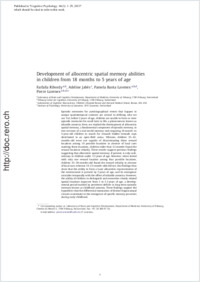Development of allocentric spatial memory abilities in children from 18 months to 5 years of age
- Ribordy, Farfalla Laboratory of Brain and Cognitive Development, Department of Medicine, University of Fribourg, Switzerland - Fribourg Center for Cognition, University of Fribourg, Switzerland
- Jabès, Adeline Laboratories of Cognitive Neuroscience, Children’s Hospital Boston and Harvard Medical School, Boston, USA
- Banta Lavenex, Pamela A. Laboratory of Brain and Cognitive Development, Department of Medicine, University of Fribourg, Switzerland - Fribourg Center for Cognition, University of Fribourg, Switzerland - Institute of Psychology, University of Lausanne, Switzerland
- Lavenex, Pierre Laboratory of Brain and Cognitive Development, Department of Medicine, University of Fribourg, Switzerland - Fribourg Center for Cognition, University of Fribourg, Switzerland - Institute of Psychology, University of Lausanne, Switzerland
-
01.10.2012
Published in:
- Cognitive Psychology. - 2013, vol. 66, no. 1, p. 1–29
English
Episodic memories for autobiographical events that happen in unique spatiotemporal contexts are central to defining who we are. Yet, before 2 years of age, children are unable to form or store episodic memories for recall later in life, a phenomenon known as infantile amnesia. Here, we studied the development of allocentric spatial memory, a fundamental component of episodic memory, in two versions of a real-world memory task requiring 18 month- to 5-year-old children to search for rewards hidden beneath cups distributed in an open-field arena. Whereas children 25–42-months-old were not capable of discriminating three reward locations among 18 possible locations in absence of local cues marking these locations, children older than 43 months found the reward locations reliably. These results support previous findings suggesting that allocentric spatial memory, if present, is only rudimentary in children under 3.5 years of age. However, when tested with only one reward location among four possible locations, children 25–39-months-old found the reward reliably in absence of local cues, whereas 18–23-month-olds did not. Our findings thus show that the ability to form a basic allocentric representation of the environment is present by 2 years of age, and its emergence coincides temporally with the offset of infantile amnesia. However, the ability of children to distinguish and remember closely related spatial locations improves from 2 to 3.5 years of age, a developmental period marked by persistent deficits in long-term episodic memory known as childhood amnesia. These findings support the hypothesis that the differential maturation of distinct hippocampal circuits contributes to the emergence of specific memory processes during early childhood.
- Faculty
- Faculté des sciences et de médecine
- Department
- Département de Médecine
- Language
-
- English
- Classification
- Biological sciences
- License
-
License undefined
- Identifiers
-
- RERO DOC 31896
- DOI 10.1016/j.cogpsych.2012.08.001
- Persistent URL
- https://folia.unifr.ch/unifr/documents/302991
Statistics
Document views: 122
File downloads:
- pdf: 379
